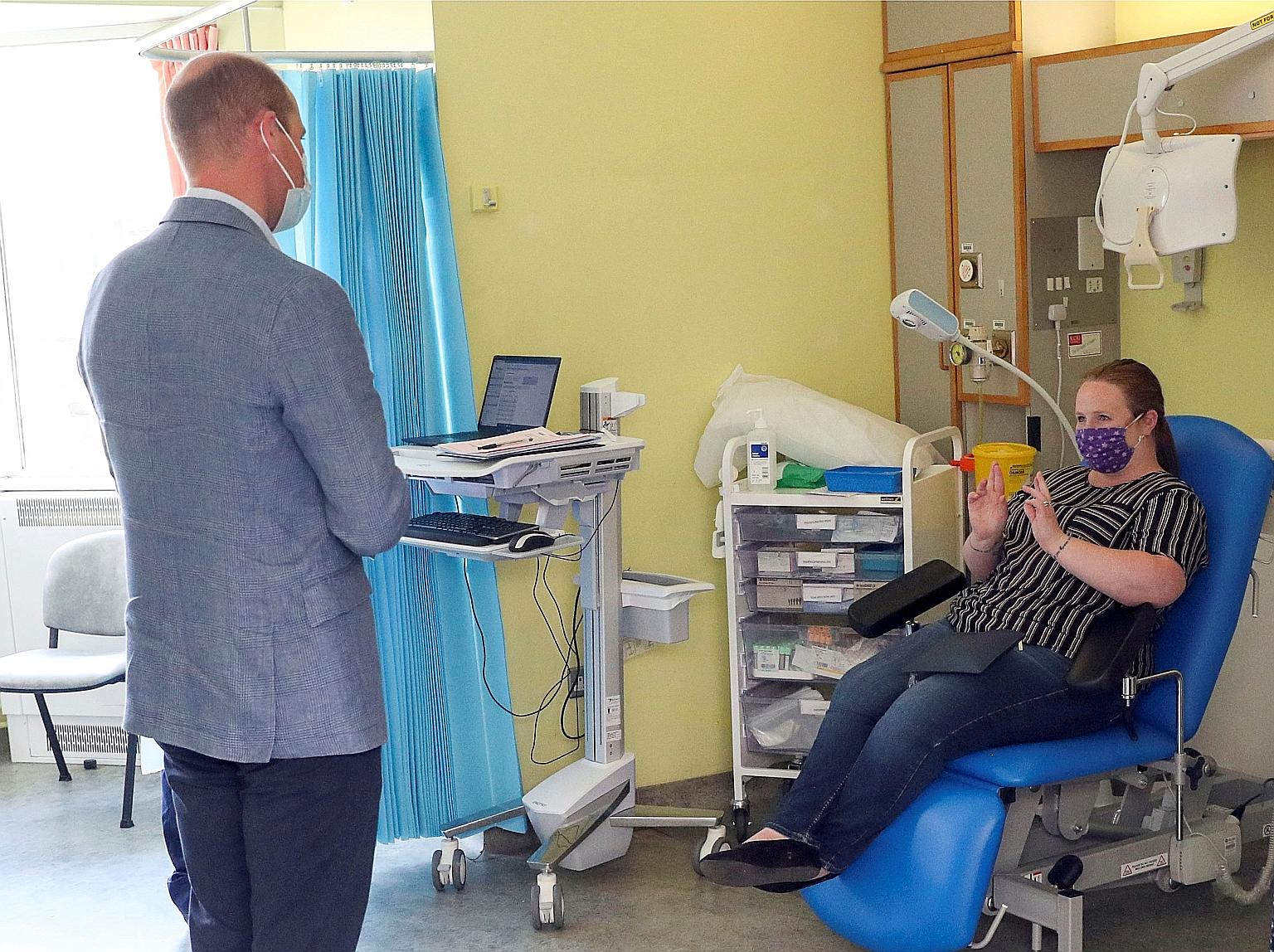Coronavirus: AstraZeneca halts trials after volunteer falls ill
Pause stems from routine review after a participant develops unexplained illness, says UK firm
Sign up now: Get ST's newsletters delivered to your inbox

Britain's Prince William talking to a patient participating in a Covid-19 vaccine trial during a visit to the Oxford Vaccine Group's facility at Churchill Hospital in Oxford in June. British drugmaker AstraZeneca's vaccine, which the company is developing with researchers from the University of Oxford, has been viewed as one of the leading candidates.
PHOTO: REUTERS
NEW YORK • British drugmaker AstraZeneca stopped giving shots of its experimental coronavirus vaccine after a person participating in one of the company's studies got sick, a potential adverse reaction that could delay or derail efforts to speed up immunisation against Covid-19.
The pause stemmed from a standard review of the company's vaccine trials after one person developed an unexplained illness, the company said in a statement.
A volunteer in the British trials was diagnosed with transverse myelitis, an inflammation of the spinal cord generally caused by infections, The New York Times said, citing a source close to the situation that it did not name.
The move was intended to give researchers time to examine safety data while maintaining the integrity of the trials, AstraZeneca said. The drugmaker's shares fell as much as 3 per cent in London yesterday.
The vaccine, which the company is developing with researchers from the University of Oxford, has been viewed as one of the leading candidates.
The partners are aiming to enrol as many as 50,000 participants for late-stage trials that are under way in Britain, the United States, Brazil and South Africa, with others planned for Japan and Russia.
"This is a routine action which has to happen whenever there is a potentially unexplained illness in one of the trials, while it is investigated, ensuring we maintain the integrity of the trials," AstraZeneca spokesman Michele Meixell said in a statement.
She added that it is too early to determine the sick participant's specific diagnosis.
The development has the potential to disrupt one of the most closely watched scientific sprints in history.
Companies have been working to find a vaccine in the hopes of blunting a pandemic that has sickened more than 27.7 million people and killed over 900,000 worldwide.
Health officials in the US and President Donald Trump have repeatedly said that it is possible to have an immunisation before the year end, and potentially as early as next month. But Dr Anthony Fauci, director of the National Institute of Allergy and Infectious Diseases, said on Tuesday it is unlikely a Covid-19 vaccine will be available to the public by Nov 3.
The World Health Organisation's chief scientist, Dr Soumya Swaminathan, said yesterday that the safety of a prospective Covid-19 vaccine comes "first and foremost".
"Just because we talk about speed... it doesn't mean we start compromising or cutting corners on what would normally be assessed," she said in a social media event.
"The process still has to follow through rules of the game. For drugs and vaccines which are given to people, you have to test their safety."
Dr Moncef Slaoui, the top US official in charge of Operation Warp Speed - the Trump administration's programme to support the rapid development of Covid-19 vaccines and therapeutics - said in a statement that Data Safety Monitoring Boards in the US and Britain are "conducting an in-depth review of the company's vaccine candidate, which is standard procedure when an adverse event occurs".
A Data Safety Monitoring Board is a panel of outside experts that watches for potential harm from experimental drugs and vaccines during clinical trials. The bar to pause a vaccine trial is generally low since participants are healthy and may never need the immunisation they have volunteered to receive.
If after investigating, the monitoring board is comfortable there are reasons unrelated to the vaccine to explain the adverse event, the trial will be able to continue, he said.
The US and other governments have invested billions of dollars to develop a shot at an accelerated pace, and more than two dozen vaccines are now being tested on volunteers less than a year after the virus was first discovered. Eleven candidates are in late-stage trials.
Meanwhile, nine leading US and European vaccine developers pledged on Tuesday to uphold the scientific standards their experimental immunisations will be held against in the global race to contain the pandemic.
The companies, including Pfizer, GlaxoSmithKline and AstraZeneca, issued what they called a "historic pledge" after a rise in concern that safety and efficacy standards might slip in the rush to find a vaccine.
The companies said in a statement they would "uphold the integrity of the scientific process as they work towards potential global regulatory filings and approvals of the first Covid-19 vaccines".
The other signatories were Johnson & Johnson, Merck & Co, Moderna, Novavax, Sanofi and BioNTech.
Co-signatory Ugur Sahin, the chief executive of BioNTech, said: "We want it to be known that also in the current situation we are not willing to compromise safety and efficacy."
BLOOMBERG, REUTERS


